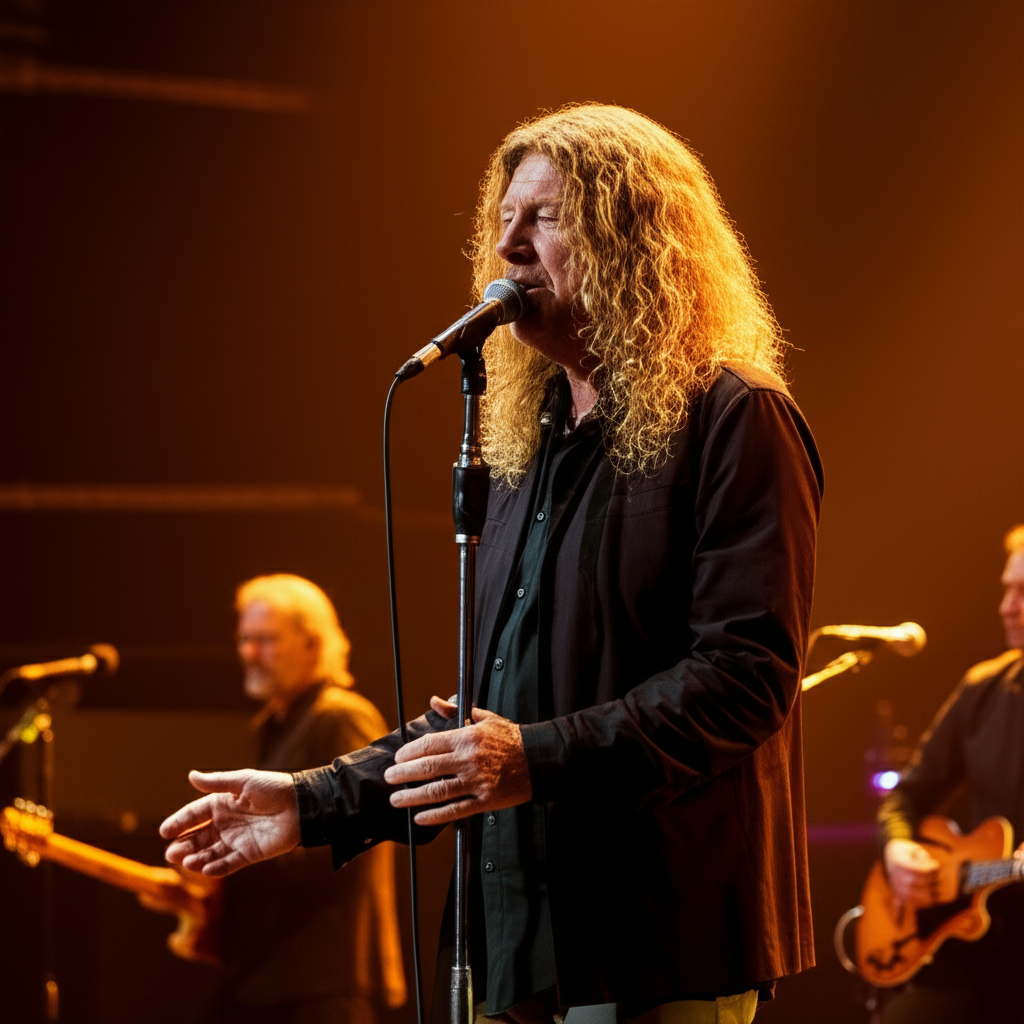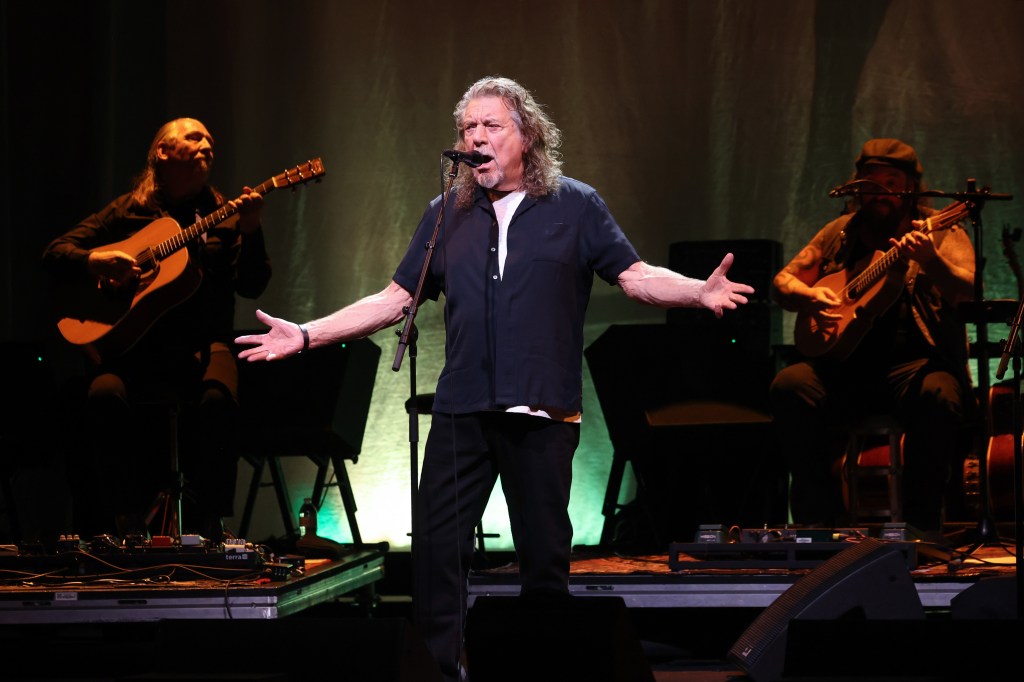There are legends, and then there is Robert Plant. At 77, the man who once fronted the behemoth Led Zeppelin isn’t merely resting on his laurels; he’s actively dismantling and reassembling the very fabric of popular music, right before our eyes. His latest tour with Saving Grace, a collective that feels less like a band and more like a musical expedition, is not just a series of concerts—it’s a living thesis, a performative dissertation on the profound, enduring connection between rock ‘n’ roll and its ancient folk progenitors. It’s a bold assertion, delivered with the quiet confidence of a master who has spent a lifetime honing his craft and questioning its very foundations.
Robert Plant’s Radical Reinterpretation of Rock History: A Century-Spanning Odyssey
The stage at the Vic Theatre, and later at the Shubert, became a temporal gateway, transporting audiences across “100 years of music,” as the narrative suggests. But this wasn’t a nostalgic trip; it was a deeply intellectual and viscerally emotional excavation. Plant, famously quoted saying, “The way I see it, rock ’n’ roll is folk music,” has dedicated much of his post-Zeppelin career to exploring the truth of this statement. With Saving Grace, he doesn’t just argue it; he embodies it, weaving a rich tapestry of sound that defies easy categorization and invites profound reflection on music’s cyclical nature.
“The way I see it, rock ’n’ roll is folk music.” – Robert Plant, a philosophy he consistently proves
For decades, Plant has been a restless spirit, unwilling to be caged by past glories. From the thunderous, blues-infused rock of early Zeppelin to the intricate, world music explorations of his solo career, he has consistently pushed boundaries, always seeking the next sonic horizon. But with Saving Grace, there’s a new gravitas, a focused intent that feels both deeply personal and universally resonant. This isn’t just about exploring; it’s about finding a new purpose, a new way to create and connect, rooted in an authenticity that strips away pretense and embraces the raw, unadorned power of acoustic instrumentation and pure vocal expression.
Saving Grace: The Architects of Timeless Sound and Subtle Innovation
Saving Grace is more than just a backing band; they are co-conspirators, fellow travelers in this audacious musical journey. Featuring the remarkable Suzi Dian on vocals, whose contributions are nothing short of revelatory, Tony Kelsey on mandolin and baritone guitar, Matt Worley on banjo and acoustic guitar, and Oli Jefferson on percussion, the ensemble crafts a tapestry of sound that is simultaneously sparse and incredibly rich. Dian’s ethereal harmonies are not merely accompaniment; they are a vital, intertwining counterpoint to Plant’s still-potent and remarkably nuanced voice, creating moments of breathtaking beauty and intimacy that often feel like whispered secrets shared amongst friends. The interplay between the acoustic instruments — the haunting twang of the banjo, the intricate, often melancholic picking of the mandolin, the grounding, almost primal rhythm of the baritone guitar, and Jefferson’s tastefully restrained yet impactful percussion — conjures a sprawling soundscape where ancient Appalachian melodies meet Celtic laments, and West African rhythms gently pulse beneath the surface.
- Suzi Dian’s vocal synergy: Her uncanny ability to weave around Plant’s voice, sometimes echoing his phrases, sometimes leading the melodic charge, and always enhancing the emotional depth, is a masterclass in vocal harmony and artistic collaboration. Her presence elevates the entire experience.
- Acoustic virtuosity and textural mastery: The precision, emotional depth, and subtle textures brought forth by Kelsey, Worley, and Jefferson transform each arrangement into a delicate, breathing sonic ecosystem. They don’t just play notes; they craft atmospheres.
- Global folk influences: The band seamlessly integrates elements from various folk traditions, from American spirituals to British Isles ballads and hints of North African modalities, creating a sound that transcends geographical boundaries and speaks to a universal human experience.
- Dynamic range: Their performances are marked by incredible dynamic shifts, moving from hushed, almost whispered passages to moments of surprising, resonant power, all without relying on electric amplification’s brute force.
- Repertoire reimagination: Each song, whether an obscure traditional folk tune or a lesser-known gem from Plant’s own extensive catalog, is not just covered but re-imagined, distilled to its essential core, revealing universal sentiments.
The setlist itself is a testament to Plant’s bold vision and intellectual curiosity. It eschews well-worn Zeppelin anthems almost entirely, opting instead for a meticulously curated collection of deep cuts, traditional folk songs, and reinterpretations that brilliantly blur the lines between genres and eras. Tracks from his critically acclaimed solo albums, such as the poignant “Nothin’ Takes the Place of You,” sit comfortably alongside venerable traditional spirituals like “Gospel Plow” and the powerful, haunting “Satan, Your Kingdom Must Come Down.” Each song is stripped to its essential core, liberated from any preconceived notions, revealing the universal sentiments, narrative threads, and archetypal themes that bind centuries of human musical endeavor together. The cumulative effect is profound, urging listeners to consider music not as a collection of disparate genres confined to rigid boxes, but as a continuous, ever-evolving stream of human expression, a river flowing from an ancient source.
The Quest for Evolution: A New Purpose Beyond Rock God Status
What drives a man of Plant’s stature, with a legacy secured for eternity and nothing left to prove, to continue this relentless quest for evolution? It’s a genuine, unadulterated passion for music, an insatiable curiosity that refuses to be sated by past achievements. On this tour, Plant finds a new purpose not just in singing, but in curating, in teaching, in demonstrating. He’s not merely performing; he’s testifying, sharing a deeply held belief about the interconnectedness of all musical forms. The sometimes-playful shyness he occasionally displayed in earlier solo outings has given way to an almost shamanic presence, a seasoned guide leading his audience through the arcane, yet deeply familiar, passages of musical history. His stage presence is less about grand gestures and more about profound connection, a quiet intensity that draws everyone in.
A Journey Through Sound and Time: More Than Just a Concert
The experience is less a concert in the conventional sense and more a communal gathering, a seance with the spirits of music past and present. The atmosphere in the theatre is reverent, yet crackles with an electric anticipation and a palpable sense of discovery. Plant, with his characteristic blend of wry wit and profound wisdom, offers illuminating anecdotes and historical insights between songs, providing essential context for the musical choices and drawing connections that might otherwise remain unseen or unappreciated by the casual listener. He speaks eloquently about the elusive origins of certain melodies, the enduring narratives embedded in age-old lyrics, and the fascinating ways these timeless themes manifest and re-manifest in contemporary forms. This deeply pedagogical approach elevates the performance from mere entertainment to an enlightening, immersive cultural event, a masterclass in musical appreciation.
One particular highlight at the Vic Theatre involved a truly mesmerizing rendition of “The Cuckoo,” an ancient folk song whose lineage traverses continents and generations, evolving with each telling. Saving Grace’s interpretation was both deeply respectful of its venerable lineage and vibrantly new, a perfect encapsulation of their overarching mission. It wasn’t about attempting to recreate the past with sterile academic accuracy; it was about demonstrating its living pulse, its enduring relevance, and its capacity for reinvention within the present moment. The audience, a diverse mix of long-time Plant devotees who have followed his every move, and younger, curious music enthusiasts drawn by the buzz, seemed to collectively grasp the profundity of the moment, hanging on every note, every vocal inflection, and every subtle nuance of the acoustic arrangements.
“To hear Plant’s voice, still capable of breathtaking tenderness, resonant power, and that unmistakable, plaintive wail, intertwined so intimately with Dian’s ethereal harmonies and the intricate acoustic textures of Saving Grace, is to witness music being reborn and redefined. It’s a truly transformative experience.” – A profound reflection from a captivated concert attendee, encapsulating the artistic alchemy at play.
The critical reception for the tour has been overwhelmingly positive, with reviewers consistently highlighting Plant’s continued artistic vitality and the unique, undeniable chemistry of the Saving Grace ensemble. Critics note how this specific project allows Plant to truly ‘sing’ again, unburdened by the sometimes-onerous expectation of soaring rock dramatics or bombastic stage presence. Instead, he delves deep into the subtleties, the delicate inflections, and the quiet, often understated power inherent in folk traditions. This approach facilitates a far deeper emotional connection, not only for the performer, who visibly revels in the freedom of this new artistic space, but crucially, for the audience, who are invited into a more intimate, reflective musical dialogue.
This tour is not just a showcase of Robert Plant’s enduring talent; it’s a significant, resonant statement about the very nature of music itself. It challenges us, as listeners and cultural commentators, to look beyond superficial genre categorizations and to truly appreciate the deep, ancient currents that flow beneath all forms of human musical expression. It reminds us, powerfully and unequivocally, that every roaring guitar riff has a whisper of an ancient lament embedded within its harmonics, and every complex, syncopated drum beat echoes a tribal rhythm that predates recorded history. Plant, with Saving Grace, is not just exploring music; he is actively redefining our understanding of its past, challenging its present conventions, and illuminating its vast, untapped potential future. He is an academic, a storyteller, and an alchemist, all rolled into one.
In an era often dominated by predictable nostalgia acts and formulaic revivals, Robert Plant stands as a defiant outlier, a true maverick. He refuses, absolutely refuses, to be a mere museum piece, a static relic of a bygone era. Instead, he is a living, breathing laboratory of musical inquiry, constantly experimenting, constantly pushing the boundaries of what a rock icon can be and how he can contribute to the ongoing cultural conversation. His journey with Saving Grace is a potent, vital reminder that true artistry lies not in imitation, nor in complacency, but in relentless, authentic evolution, in the courage to constantly redefine oneself and one’s art. He is proving, once and for all, that the heart and soul of rock ‘n’ roll has always been, and will always be, the collective voice of the people, singing their stories, their joys, and their sorrows through the ages, perpetually seeking new forms and new resonances.
The final notes fade into the hushed anticipation of the theatre, leaving behind a silence that paradoxically resonates with the echoes of a hundred years of human song. Plant, with a knowing smile and a deep sense of contentment, acknowledges the fervent applause, not as a rock god receiving worship, but as a humble, grateful custodian of a shared human musical heritage. He has not just performed a concert; he has conducted a profound communion, binding us all, however briefly, to the timeless, boundless spirit of sound. The journey continues, and so does the song, forever evolving, forever returning to its primal, powerful roots, promising more revelations yet to come from this tireless explorer.


